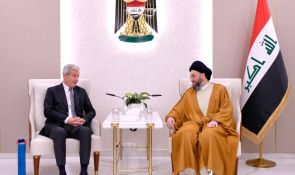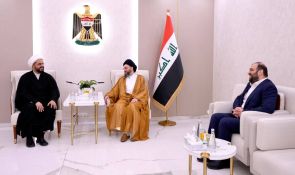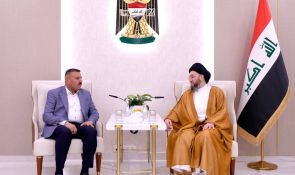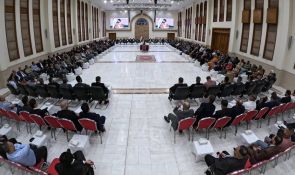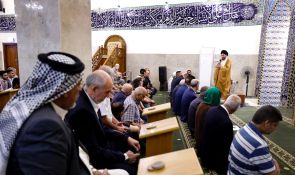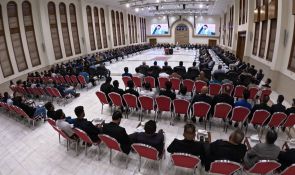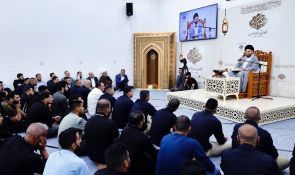Sayyid Ammar al-Hakim says, “An official has to fill the gap between himself and the citizens and must make his subjects feel that he is one of them.”
Sayyid Ammar al-Hakim, Head of the Islamic Supreme Council of Iraq (ISCI), has stressed that leadership must combine doctrinal and emotional dimensions, and that the administration is not issuing orders, stressing that an official must make his subjects feel that he is one of them, living their suffering, and that whatever affects them affects him, that he feels their pain. His Eminence cited his evidence from the Qur’anic way which stresses that the Prophet (Õ) is one of the people, one of them, who walks in the streets and eats the food. He regarded gentleness and kindness as the characteristic of the successful leader, explaining that an official must fill the gap between himself and the citizens, that he must distance himself from grudge, intimidation and frightening those who criticize him, stressing that the sentimental dimension has a big role in the leadership system. This came up in the Hussaini mourning gathering held at the Baghdad office of His Eminence on Wednesday, November 21, 2012.
His Eminence explained that reliance on Allah grants His servant high determination: Those who rely on Allah have high determination, solid administration, and the high ability to make decisions, regarding not adopting a stance towards those in the news media who criticize as an important reason for the success of the official. He stressed that if an official wants to succeed, he has to obligate himself with whatever he obligates people, that he does not order people to do something while doing its opposite, explaining that if such a thing takes place, it will be the start of a crack in the relationship between the leadership and the nation. He pointed out to the small goals and personal interests not uniting a people, that the narrow objectives do not mobilize a nation. His Eminence explained that a leader must not surrender to the will of the public opinion if the public opinion is wrong. His Eminence added saying that the public anger, when there are real reasons behind it, gets bigger and topples an official, citing the evidence of the Arab Spring and what happened in Iraq: the public anger that toppled the [Saddami] regime. But if the refusal is based on a misconception or a problem, the official must rely on Allah, and Allah removes the problems from his way, calling for self-criticism, for investing the Hussaini gatherings by opening a new page with those who dispute with you.
The Head of the Supreme Council pointed out that the seventh eve of Muharram is the eve of al-Abbas (Ú) who is immortalized in history although he was not infallible, and that he was the source of comfort in the camp of al-Hussain (Ú), a man who was feared by the enemies. His Eminence wondered about what is said regarding the loyalty, truthfulness, insistence, clarity, foresight, vision and reliance on Allah of Abul-Fadhl al-Abbas (Ú)?! He stressed that the peak of reliance was in his conduct. Suffices him the description vested on him by Imam al-Hussain (Ú) as the bearer of his standard, emphasizing that life is a stance, so much so that al-Abbas (Ú) became a gate for al-Hussain (Ú), that al-Abbas (Ú) submitted the evidence, the message, which was directed to history about the lowliness of his enemies when they prevented him from getting water to reach the children


